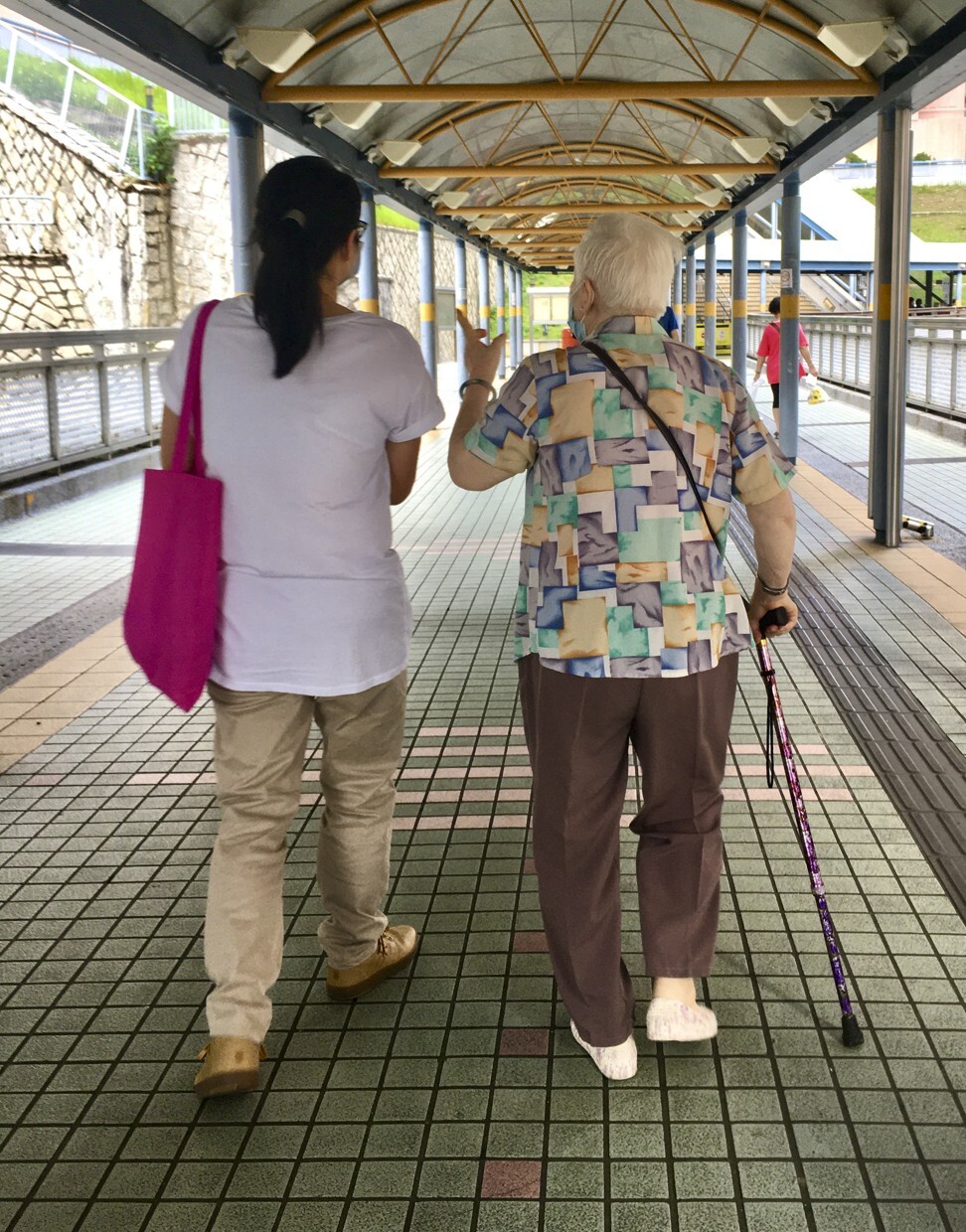
As social isolation adds to loneliness of the elderly, charities reach out to keep people connected
- Many of Hong Kong’s elderly people living alone were already not getting enough social contact, but the pandemic has isolated them even more
- Charities across the city are tackling this problem through initiatives including phone call services and care package deliveries
Walking stick in hand, 91-year-old Lau Yuet-chun sets a brisk pace crossing the courtyard of the Sau Mau Ping Estate, one of Hong Kong’s oldest public housing estates located in Kwun Tong district and a place she has called home for 50 years. Her secret to longevity is simple: “Eat less and light.”
While Lau’s mind is sharp, her body is letting her down. She has knee problems, hypertension and high cholesterol. Thirty years ago she had a kidney removed. “I also have type-2 diabetes,” she adds, offering one of the “emergency” sweets she carries in her pocket.
She also gets lonely. Her husband, who she married at the age of 16 after moving to Hong Kong from Dongguan in China’s Guangdong province, died 17 years ago. She has five children, nine grandchildren and two great-grandchildren, but has seen little of them since social distancing, one of the measures introduced to contain the spread of Covid-19, became the norm.
Most of her days are spent peering through the window of her flat or watching daytime television. “I miss going to the market to buy fresh fish, fruit and vegetables, and I miss catching up with friends at the Good Neighbour Network,” she says, referring to the Sau Mau Ping branch of the social support charity that has been closed during the coronavirus outbreak.

The charity serves the city’s chronically ill, with most of its 730 members aged over 60 and 21 per cent relying on government handouts – Comprehensive Social Security Assistance of about HK$3,500 (US$450) a month. One-third are elderly and live alone.
Grey matters: as Hong Kong ages, service industries grow
Today, the elderly in Hong Kong – and worldwide – feel more isolated than ever as the coronavirus, which has now claimed more than 300,000 lives globally, takes an emotional and physical toll. Fears are compounded by studies that show the virus predominantly kills the sick and the old.
A study of the virus by the Chinese Centre for Disease Control and Prevention, published in February’s Chinese Journal of Epidemiology, put the overall fatality rate at 2.3 per cent, a figure that rises to 3.6 per cent for people aged 60 to 69, 8 per cent for those between 70 and 79, and 14.8 per cent for those aged 80 and above. The study also identified which existing illnesses put patients at risk: cardiovascular disease was number one, followed by diabetes, chronic respiratory disease and hypertension.

Concerns over viral transmission, and its serious impact on the elderly, has seen family and friends spend less time together, says clinical psychologist Hannah Reidy, chief executive of Mind Hong Kong, a charity dedicated to raising mental health awareness.
“Social distancing helps safeguard people’s physical health, especially older adults, but the lack of family and social connection is likely to have a negative impact on their mental well-being,” Reidy says, adding that loneliness is both a contributing factor, and a result, of many physical and mental health problems such as anxiety, depression and even cognitive decline.
“According to the 2016 Hong Kong census, about 150,000 elderly aged 65 and above live alone, and almost 300,000 elderly live with their spouse. Seeing as nearly all older adults experience loneliness or social isolation to some degree, this is a major area of concern for us.
“Before the pandemic, many elderly enjoyed yum cha [dim sum] with friends, engaged in activities at community centres and took trips across the border. But the pandemic disrupted these routines and increased the amount of time older adults spend alone.”
An elderly gentleman who got a phone call from one of our volunteers said it was the first conversation he’d had in almost a month
“The whole Hong Kong population, young and old, should make mental well-being a priority by checking in on others and themselves,” Reidy says.
HandsOn Hong Kong, a charity that connects volunteers with community needs, is doing just that. It operates Covid-19 relief programmes to help the city’s most vulnerable, including the elderly, low-income families and those dealing with mental illness. One programme involves the delivery of care packages comprising masks, hand sanitiser and food items such as rice, noodles and cooking oil.

“It’s a difficult time for all, but we can’t forget that even before the coronavirus outbreak, one-third of Hong Kong’s elderly population were living in poverty,” says the charity’s associate director Cath Dannaoui.
Times are tough, but Dannaoui says she has been inspired by the city’s collective generosity.
“Despite social distancing and an overstretched charity sector, the Hong Kong community is more united and supportive than ever – it’s truly amazing,” she says, adding that within two days of launching its care package delivery programme in April, most of the volunteer spots for May were filled. “By the end of June, volunteers will have made more than 1,000 doorstep deliveries to support these vulnerable individuals.”

Dannaoui says people have also been quick to sign up for its supportive phone call programme, whereby volunteers make regular calls to check in with self-isolating elderly people.
“Volunteers are matched with an elderly person and they ring them a couple of times a week, asking them how they are spending their days and other questions that can tell us a lot about someone’s emotional and physical well-being,” she says.
“If an elderly person says they are staying in bed all day, then that raises a red flag that they might be suffering from depression. Others might share health concerns or make requests for items such as books to read … it’s a way of uncovering information that some of the other support networks don’t have time to do.”
Dannaoui says one case tugged at her heartstrings. “An elderly gentleman who got a phone call from one of our volunteers said it was the first conversation he’d had in almost a month. This programme is very simple, but so beautiful and powerful.”

Karen Ngan of the Good Neighbour Network says many elderly people have benefited from the phone support service, including Lau, who receives calls from a British student studying medicine in Hong Kong.
“The elderly enjoy their chit-chats with the volunteers, with most conversations lasting between 20 and 40 minutes,” she says.
The network’s office usually hosts a range of health and social activities, including dance groups, handicraft workshops, and talks on health and nutrition, before it closed its doors due to the pandemic.
In one corner, a glass cabinet displays paper animals crafted in an art class. On a table, board games sit unused, including Rummikub, which combines elements of the card game rummy and mahjong, with the somewhat ironic tagline “Brings people together”.
“We’re waiting for the government to give us the green light to reopen,” Ngan says. “Many of the elderly who visited this centre before the outbreak are now stuck at home and boredom is a big problem. They miss socialising with their friends and family.”

Alice Lai Sau-wo of the Hong Kong Society for the Aged can relate. She says the charity, which serves about 10,000 people, has seen how social distancing has further isolated the elderly.
“The elderly are spending less time chatting with friends in the park or gathering to drink tea. And with the closure of most public and entertainment facilities, combined with fears of transmission using public transport, there is a lack of meeting points.”
Lai says that in March, when the supply of masks was tight, many elderly people were confined to their flats for a week at a time, with television their only source of entertainment.
“When we visited our elderly members, more than half of those living alone told us they were bored and lonely and had no idea what to do,” she says.

A survey conducted this month by the Sau Po Centre on Ageing, part of the University of Hong Kong, found about 10 per cent of the 385 people interviewed were experiencing severe chronic loneliness, Lai says.
“Loneliness among Hong Kong’s elderly requires increasing attention from the community as it is affecting their lives and their health.”

